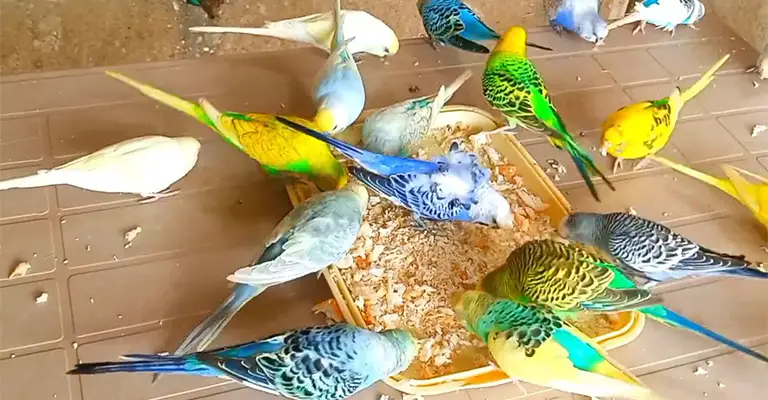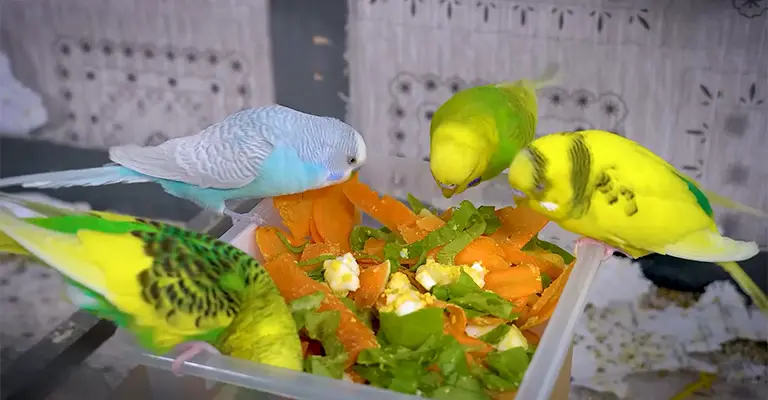The delightful world of budgies is full of intriguing behaviours that often leave pet owners both amused and curious. One such behaviour that can capture attention is a budgie’s habit of digging in its food bowl.
This seemingly peculiar action might raise questions about the underlying reasons driving this behaviour.
Understanding why is my budgie digging in her food bowl- reasons involve delving into their instincts, natural behaviours, and environmental influences.
By unravelling this avian enigma, we can gain insight into the complex interplay of factors that shape a budgie’s actions around mealtime.

Why Is My Budgie Digging In Her Food Bowl- Reasons?
Budgies digging in their food bowl is a behaviour rooted in their instinctual behaviours and the diverse reasons they might exhibit this action.
Here are some potential explanations for this intriguing behaviour:
Foraging Instinct
In the wild, budgies spend a significant amount of time foraging for food. Digging in their food bowl mimics this behaviour as they try to uncover and explore their food.
Exploratory Behavior
Budgies are naturally curious creatures. Digging might be their way of investigating their environment, including the contents of their food bowl.
Adjusting Food Position
Budgies sometimes dig to rearrange their food or seeds in the bowl. This instinct could stem from a need to ensure the food is distributed optimally.
Expressing Contentment

Budgies may dig in their food bowl when they are content and relaxed. This can be a sign that they are comfortable and feel secure in their environment.
Physical Activity
Digging is a physically engaging activity for budgies. It provides exercise for their legs and feet, which helps maintain their physical well-being.
Entertainment
Digging can be an entertaining pastime for budgies. It keeps them mentally stimulated and prevents boredom, especially in captivity.
Hormonal Changes
Hormonal shifts can influence budgie behaviour. During the breeding season, females might dig as part of nesting preparations, while males might dig to show potential mates their ability to provide nesting material.
Social Imitation
If one budgie starts digging, others in the same enclosure might follow suit. Budgies are social birds and often learn from observing their flockmates.
Environmental Factors
Changes in the environment, such as new toys, perches, or even cage rearrangements, might trigger digging behaviour as the budgies explore and interact with their surroundings.
Remember that budgies are complex creatures with a range of behaviours, and each individual may exhibit digging for slightly different reasons.
Providing mental and physical stimulation through toys, perches, and a stimulating environment can help channel this behaviour in a positive direction.
What To Do If My Budgie Digging In Her Food Bowl?

If your budgie is digging in her food bowl, there are different actions you can take depending on the situation and the reason behind the behaviour.
Here are some possible actions you can take:
Observe and Understand
The first thing you can do is to observe and understand why your budgie is digging in her food bowl.
Digging can have different meanings and purposes for budgies, such as foraging, playing, bathing, nesting, expressing, copying, destroying, hiding, or digging.
By observing and understanding the context and the motivation behind the digging, you can decide how to react and intervene accordingly.
Encourage and Reward
If your budgie is digging in her food bowl as a sign of curiosity, playfulness, affection, or creativity, you can encourage and reward this behaviour.
By encouraging and rewarding this behaviour, you can reinforce the positive relationship between you and your budgie and make him or her happy and satisfied.
Intervene and Stop
If your budgie is digging in her food bowl as a sign of dominance, aggression, jealousy, or destruction, you may need to intervene and stop this behaviour.
By intervening and stopping this behaviour, you can prevent any conflicts or injuries between you and your budgie or between your budgie and another bird.
Provide and Supplement
If your budgie is digging in his or her food bowl because he or she is hungry, greedy, bored, or stressed, you may need to provide and supplement him or her with extra food, water, nutrition, stimulation, and activity.
You can also provide him or her with a balanced and varied diet that includes seeds, pellets, fruits, vegetables, cuttlebone, mineral block, egg food, sprouted seeds, and millet spray.
By providing and supplementing your budgie with extra food, water, nutrition, stimulation, and activity, you can reduce his or her tendency to dig in his or her food bowl out of hunger, greediness, boredom, or stress.
Change and Improve
If your budgie is digging in his or her food bowl because he or she is not happy or secure in his or her cage or surroundings, you may need to change and improve his or her environment or surroundings.
You can move his or her cage to a different location away from the source of stress or disturbance.
By changing and improving his or her environment or surroundings, you can stimulate his or her senses and curiosity.
Adjust and Regulate
If your budgie is digging in his or her food bowl because he or she is experiencing hormonal changes or activity, you may need to adjust and regulate his or her lighting schedule to balance his or her hormones and mood.
You can provide him or her with 12 hours of darkness and 12 hours of light each day. By adjusting and regulating his or her lighting schedule, you can reduce his or her tendency to dig in his or her food bowl out of dominance, aggression, or jealousy.
Consult and Treat
If your budgie is digging in her food bowl because he or she is sick, injured, or stressed, you may need to consult and treat his health condition.
You can check your budgie for any signs of illness or injury, such as sneezing, wheezing, coughing, bleeding, swelling, loss of appetite, weight loss, feather plucking, lethargy, depression, aggression, etc.
A vet can diagnose and treat your budgie’s condition and advise you on how to care for him properly. By consulting and treating your budgie’s health condition, you can help him recover, heal, and grow.
Accept and Appreciate
If your budgie is digging in her food bowl because he or she likes to dig and explore, you may need to accept and appreciate his personality preference.
You can also praise him for his vocal skills or his adaptability. By accepting and appreciating his personality or preference, you can show him that you care and respect him.
Enjoy And Have Fun
If your budgie is digging in her food bowl because he or she is having fun or enjoying himself or herself, you may need to enjoy and have fun with him or her, too.
You can watch how he or she digs in his or her food bowl and admire his or her skills or creativity. By enjoying and having fun with him or her, too, you can share his or her joy and excitement.
FAQ
Budgies have innate foraging instincts. Digging mimics natural behaviour to uncover food in the wild, engaging their mind and body.
Not necessarily. Digging isn’t a sign of food dissatisfaction. It’s more about exploring and engaging in instinctual behaviours.
Yes, budgies dig due to boredom. Provide toys, perches, and foraging opportunities to keep them mentally and physically stimulated.
Occasional digging isn’t usually linked to illness. However, if it’s accompanied by other unusual behaviours or signs of sickness, consult a vet.
Offer foraging toys or sprinkle food on the cage floor to encourage natural digging behaviours. Rotate toys and create a stimulating environment to minimize boredom-driven digging.
Conclusion
The act of a budgie digging in its food bowl reveals a fascinating blend of instinct and adaptation to the captive environment.
From mimicking natural foraging behaviours to expressing curiosity or even attempting to modify their surroundings, the reasons can vary.
As responsible caretakers, our role is to provide a stimulating and enriching environment that caters to their natural tendencies.
By offering a mix of activities, foraging opportunities, and a balanced diet, we can satisfy their instincts and encourage healthier behaviours.
Embracing these quirks reminds us of the intricate relationship between nature and captivity, as well as the joy that comes from observing these vibrant and endearing avian companions.